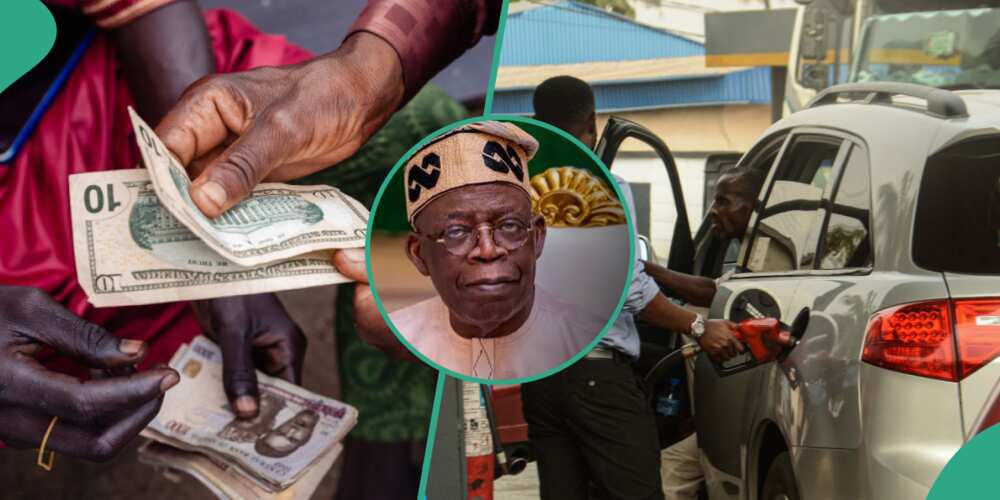Year in Review: Cash Scarcity And Other 10 Events That Made Life Difficult for Nigerians in 2023
Legit.ng journalist Dave Ibemere has over a decade of experience covering tech, energy, stocks, investments, and the economy.
For many Nigerians, this outgoing year (2023) will be remembered as a time marked by enduring challenges beyond their control.
It is also a year that was welcomed with cash scarcity and ended with the same problem.
Weak naira, subsidy removal, and inflation, among several others, brought real hardship.

Source: Getty Images
Legit.ng gives a snapshot of these economic events and how they shaped the lives of average Nigerian households in the last 12 months.
PAY ATTENTION: Click “See First” under the “Following” tab to see Legit.ng News on your Facebook News Feed!
Cash Scarcity
The year was welcomed with anger, frustrations, and protests as Nigerians faced a tough Naira scarcity that grounded countless small and medium businesses and pushed millions of families into increased poverty.
According to a report by SB Morgen (SBM) Intelligence, about 36.96% of Nigerian businesses had to lay off staff or reduce working hours to weather the cash shortage.
The report further stated that the percentage of those who said their enterprise was significantly impacted totalled 76.09%, and 17.39% said their businesses were somewhat affected. In comparison, 6.52% said their ventures were not affected at all.
Cooking Gas Price
A 12.5kg of cooking gas, which sold for between N9,000 and N10,000, depending on the point of purchase across Lagos by the end of September, suddenly rose to a staggering N12,500 at the dawn of October.
November figures show a further uptick, with the estimated average price rising to N13,190, reflecting an increase of N690 from October.
This hike has been attributed to the increase in the cost of crude oil and the depreciation of the Naira.
The rise in gasoline prices is causing hardship for many Nigerians who struggle to afford basic necessities. It's also leading to an increase in Inflation, as the cost of other goods and services is also rising.
Fuel Subsidy Removal
Data from the National Bureau of Statistics says the average price of petrol in Nigeria increased by over 210%, ranging from N550- N750 depending on the region from an average price of 200.
This massive increase significantly impacted the cost of living as low-income citizens faced more significant financial strain to meet their basic food needs and increased transportation costs.
Incessant National Grid Collapse
Nigerians continue to remain in darkness despite several promises from the federal government.
In 2023, Nigeria's grid suffered three total collapses, each causing widespread blackouts across the country, with businesses and homes being affected.
Also, a recent report from the Nigerian Electricity Regulatory Commission (NERC)shows that for the Quarter of 2023, the 26 power plants' generation capacity dropped to 4,387.91MW, representing a -4.73% decrease.
Exchange rate
Since the Naira was floated, its value has declined steadily against other major currencies.
The dollar exchange rate in the parallel market moved from N736 in January to N1300 in October 2023.
In the official market, it is trading above N800 for one dollar.
Imports are now more expensive, and prices are rising due to this.
But there is optimism that 2024 will be better.
Amamchukwu Okafor, Senior Consultant at Native Insight, told Legit.ng:
"After all the foreign exchange reforms, the long-term target for the Nigerian government should be to expand local production and export capacity to increase (non-oil) FX revenues.
"I have always said, in the short run, the government can drastically reduce the artificial demand for FX by reducing informality in imports and FX trading."
Inflation
Inflation figures increased to the highest rate in 18 years, hitting 26.72% in September, 27.3% in October and 28.20% in November 2023.
The prevailing high Inflation in Nigeria is eroding the value of money, which may likely reduce investment and the real GDP growth rate. All items' prices shift upward on the other market day.
Also, Inflation prompted a string of interest rate hikes from the central bank, making getting loans for businesses even more expensive.
Union Strike
The Nigerian Labour Congress (NLC), Trade Union Congress of Nigeria (TUC), and Frontline doctors in Nigerian public hospitals, among many other unions, embarked on indefinite strikes severally over grievances, including demands for a pay rise after the removal of a subsidy on petrol.
This, in turn, caused job losses, Inflation and deflated productivity. Abdul Bala revealed that he lost N4 million ($3,000) at the Apapa Lagos Seaport due to the workers' fifth strike in 2023.
Insecurity
The fact that Nigeria is missing from the 2023 Africa's most peaceful nations list according to the 2023 Global Peace Index (GPI) tells the story of the year.

Read also
Start petty trade with President Tinubu's grant, minister urges beneficiaries in Cross River
SBM Intelligence reported that at least 430 civilians were killed, while over N5 billion was demanded from 3,620 persons in 582 kidnap-related cases.
Insecurity has also been blamed for the rising food prices, as many farmers are afraid to use their farms.
Food Price
The year 2023 has been challenging for Nigerian households as major staple food prices skyrocketed.
For instance, a bag of rice was sold for around N28,500 in April; now it is between N52,000 and N55,000; a keg of vegetable oil sold for N32,000 around the same period is N42,000. Even "garri" – cassava flakes – which used to be N18,000 per bag, now goes for N28,000.
The NBS's latest consumer price index report showed that the average annual food inflation rate for the twelve months ending November 2023 over the previous twelve-month average was 27.09%.
This is the highest inflation level report in over 18 years.
To understand clearly how tough the year has been for Nigerians, the NBS report showed that primary reasons for rising food inflation are increases in Bread and cereals, Oil and fat, Potatoes, Yam and other Tubers, Fish, Fruit, Meat, Vegetables and Coffee, Tea and Cocoa.
These are everyday foods for average Nigerian households.
Diesel, Jet Fuel
Between June and October this year, the prices of diesel and aviation fuel increased by over 50%
The Manufacturers Association of Nigeria warned that many factories were closing down due to the high cost of diesel, which has more than doubled in price over the past year.
This has led to job losses and a decline in production, causing hardship for workers and businesses.
In the aviation industry, many airlines have had to cancel flights or increase ticket prices due to the high cost of jet fuel.
For example, a 1-hour journey from Lagos to most south-eastern states in December costs as much as N500,000.

Read also
EIU delivers powerful predictions about naira, others in 2024, lists factors to drive currency
Marketers identify cabal behind the rising price of cooking gas in Nigeria
Earlier Legit.ng reported that Cooking gas marketers under the Nigerian Association of Liquified Petroleum Gas Marketers (NALPGAM) accused the Liquified Petroleum Gas (LPG) terminal operators of causing the country's high cooking gas cost.
Oladapo Olatubosun, the association's president, disclosed this when they met the senate committee on gas in the company of the group members.
The commodity's price recently increased to N1,200 per kilogram, with many Nigerians lamenting its high cost amid surging Inflation and high living standards.
PAY ATTENTION: Unlock the best of Legit.ng on Pinterest! Subscribe now and get your daily inspiration!
Source: Legit.ng





